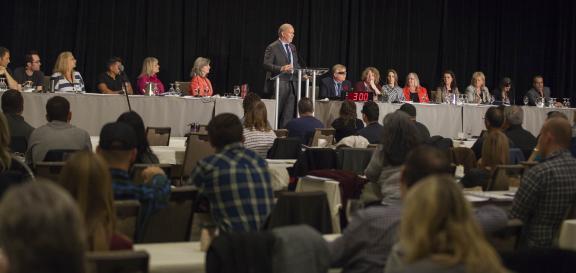Greetings from the City of Vancouver
The afternoon of the 2015 convention began with greetings and remarks from Deputy Mayor for the City of Vancouver, Andrea Reimer.
“Whether you got here today by highway, runway or SkyTrain, we’re happy to have you here.” Reimer went on to thank the delegates for the work they do in their worksites and in their communities. “Your support for fairness and good paying jobs in a diverse range of sectors is making sure that people across BC and Western Canada can do their job safely and effectively while earning a decent living to support themselves and their family,” she said.
Reimer explained that Vancouver is a great city because of the strength of the city’s labour movement, which had a long and storied history. She pointed to the work done by the members of CUPE 15 and 104, and the police and firefighter’s unions who keep the city clean and safe, and who ensure that the city’s community services run well.
Moving from “COPE to hope”, Reimer told delegates that she woke up early to watch the new Prime Minister’s swearing-in ceremony with her family. “I didn’t expect that,” she said, “especially as at my age I remember previous Liberal governments.”
Asking herself why it mattered, she came to the conclusion that over the last ten years she had allowed her hope for Canada to shrink. “I – we – stopped fighting to and instead we’ve fought to hold on, to make sure things didn’t shrink more.”
“That’s why we fight so hard to win better policies for people here in Vancouver,” Reimer said, moving to the topic of affordability.
She acknowledged that affordability is a huge challenge, which is why the city needs good paying jobs. Reimer and the Mayor have both been big supporters of the BC Federation of Labour’s Fight for $15 campaign to raise the wage across our province.
She went on to detail how the City has been taking steps to become a Living Wage employer for all employees. Reimer also said that Vancouver is also investing more money into childcare than ever before, and that they are the only city that puts this much money into childcare. That effort is mirrored by their work on affordable housing, on which they hope to partner with the new federal government.
“The key here,” Reimer said,” is voters rejected divisive, out of touch politics.”
Reimer ended by thanking President David Black for his leadership within the labour movement and in the political sphere, and reiterated her thanks of all the union’s activists for the work they do building their communities.
Health and Safety Report
Next came the Health and Safety Committee report, given by Vice-President Gwenne Farrell.
Farrell spoke about the acknowledgement in health and safety legislation via Bill 14, enacted in May of 2012, that the work environment can cause mental health disorders. Previously, such injuries were only acknowledged if the impacts were felt as a result of something not part of the normal course of work. “A paramedic,” Farrell explained, “couldn’t claim for PTSD incurred from seeing several violent injuries at work.” This has been changed and furthermore, this change forces employers to do risk assessments for these dangers in workplaces. Unfortunately, Farrell noted, of the claims that have been submitted under this bill, very few have been accepted.
Farrell also reported out on recent developments with respect to the Macatee report, which was prepared to address the preventable sawmill explosions in B.C. and changes that were made to Grant’s law to weaken the protections for workers working alone.
Farrell notes that that the union was working hard with Fortis, who she called “our new problem child” with respect to health and safety
When it came time to ask questions Jordan Campbell from Fortis rose to the microphone to thank the union and its Health and Safety Coordinator Steve Milne for the training at union office. “I’m surprised and impressed with effort union has put into getting the committee on track,” he said. “Thank you.”
Constitution and by-laws
The constitution and by-laws committee presented the first nine amendments posted here. Eight of the nine constitutional changes carried. C2 referred back to committee.
Human Rights Committee Report
Human rights committee chair Joyce Galuska was joined on stage by QUILTBAG (Queer/Questioning, Undecided, Intersex, Lesbian, Transgender/Transsexual, Bisexual, Allied/Asexual, Gay/Genderqueer) subcommittee chair Petro Koromvokis.
During her report Galuska covered a great may topics, including her activism on murdered and missing aboriginal women. She helped spearhead a letter-writing campaign at MoveUP in support of a national inquiry for the many murdered and missing indigenous women. This campaign was adopted by the Canadian Labour Congress and extended to all CLC affiliates.
Galuska listed some of the organizations that the Human Rights Committee supports, including CoDevelopment Canada, Reconciliation Canada and Out in Schools. “[Out in Schools] attend schools and talk about the impact of homophobia and transphobia. I’m so happy MoveUP supports this organization.”
Galuska also spoke about the work and mandate of the QUILTBAG subcommittee, and asked for volunteers for both committees to help them do their work. “This is where my ask comes out,” she said, and encouraged all delegates to learn more and to get involved.
National President
Gwenne Farrell spoke as the National Union Secretary-Treasurer to introduce the COPE SEPB National President Simon Berlin.
In addition to being the National President, Berlin is the SEPB-Québec Executive Director and a Vice-President of the FTQ, the Fédération des travailleurs et travailleuses du Québec.
Berlin started with a hearty “Bonjour tout le monde!” before switching to English.
Berlin detailed the National union’s growing global solidarity work. “Recently I’ve had the opportunity to travel with your officers, to the UNI Global Union meeting in South Africa and to the UNI Finance meeting in Turkey.
Talking about the impact South African politics and trade unions had on him, Berlin said “I was reminded very much of Nelson Mandela’s words: ‘You never think it’s possible until you do it.’ We have many things that we may think as a union that may not be possible. But we can do it.”
It was important for the National union to be in Turkey, explained Berlin, because COPE/SEPB is the largest union in Canada, perhaps in North America, that represents finance workers. “They’re about 40 per cent of our workers,” he said. It’s imperative to learn from other finance unions and hear about the challenges faced by finance workers around the world.
Moving to politics, “[Your union] is an involved union,” Berlin said. “When I was here for the opening of your office in the summer, I did a little election canvassing in Surrey. I was surprised and gladdened about what a good reception we received.”
“Our hopes were high. I said then that Quebec and B.C. would lead the way and throw the bums out,” he continued. “We didn’t get the result that we wanted but we did throw the bums out.”
“And now we get to keep our eyes on the prize,” he said. “We get to fight for issues, not against. We can fight for a stronger pension plan and better employment insurance. We can fight for the environment and for women’s rights.”
It will be important to hold the new federal government to account, said Berlin. The labour movement has always advocated for the rights and a better life for workers, and will continue to do so. “This government will be there for a while but we will be there for a while longer.”
Berlin finished with a strong message of support and solidarity for the locked out BCAA workers. “When I was here I got to visit these brave, strong people,” he said. “They’re inspiring and I am with them all of the way.”
Political Action Committee
The Political Action Committee is mandated to support progressive parties and candidates at all levels of government. The report was given by Lori Mayhew and focused largely on recent successes, starting with the 2014 municipal elections. This union supported several candidates, both members and staff. “I’m pleased to say we have an 80 per cent success rate on getting our candidates elected at the municipal level,” said Mayhew.
She then moved to the Alberta election, and talked about the mistake Jim Prentice made in the Alberta election by underestimating Rachel Notley and the NDP.
While the federal election has just passed the Political Action Committee is already making plans for the future, including for the upcoming municipal elections in Manitoba and Saskatchewan. “It’s important to support progressive municipal candidates in part because they provide the farm team for provincial and federal levels,” she said.
Of the committee’s continued work, making progressive change “is like an exercise program,” said Mayhew. “You have to keep active, you have to keep at it.
“Of course 2017 is the election in B.C. and it’s going to be the heave Christy campaign,” she finished to the delegates’ applause.
BC NDP Leader John Horgan
Fittingly, Mayhew then introduced BC NDP leader John Horgan.
“It’s great to be in the room with you…and it’s good to be talking to you about the future, our future together,” he said.
Horgan brought some of his caucus-mates with him, or “besties”, as he called them: Shane Simpson, Labour Critic, Maurine Karagianis Caucus Whip and Women, Seniors, and Early Childhood Development and Carole James, Finance Critic.
Speaking to the delegate who expressed a desire to hear the NDP talk explicitly about workers, Horgan said, “I heard the sister loud and clear. We will connect to our roots so working people know we’re on their side.”
Turning to the BC Liberal provincial government, currently mired in scandal for deleting government records, Horgan explained that there’s a three-step approach in “BC Liberal land”. “First,” he said, “you deny there’s a problem. If that doesn’t work, you deflect. If those two Ds don’t work you can always press the delete button. That’s right, you can just press a button and everything’s going to be fine.”
“If we’re going to get the change we want,” said Horgan, “we have to get active off the couch and throw the buggers out. That’s in 79 weeks. Yes, I’m counting.”
Horgan then praised this union for the work done to defend BC Hydro against privatization, and in support of expanded public transit in B.C.
Moving to ICBC, he said, “When Dave Barrett and the NDP introduced ICBC, there was such an outcry from right wing businesses. But successive right wing governments have failed to privatize ICBC because it works and provides good service.”
Continuing with the theme of change, Horgan talked about what the hope and possibility he saw when he attended the swearing in of the Notley government in Alberta. “There were 20,000 people on the lawn of the legislature, feeling the excitement of change and thinking ‘we just changed the government after 50 years of the same thing.’”
Horgan then took questions from delegates on the floor.
One of our Fortis members go to the microphone and said that she was daughter of an immigrant and she recently asked her parents why they moved somewhere so unaffordable. She wanted to know what the BC NDP would do about affordability and growing communities. Horgan replied that the first thing any government would need to craft smart, effective policy is data that would shine a light on the causes of the problem. Which, to date, the BC Liberals have declined to collect.
Joyce Galuska asked several questions, including one about the Highway of Tears in the north of B.C. where several aboriginal women have gone missing. In response, Horgan called to Maurine Karagianis and asked how many times she had has asked the Rich Coleman about the Highway of Tears in the legislature. “About 30 times,” she said. “In fact, that was the start of the ‘delete, delete, delete’ scandal,” explained Horgan. “The government apparently spoke with 80 groups in the North, and wrote nothing down.”
Women’s Rights Committee
Each member of the Women’s Rights Committee took a part of their report, which covered the skills building program that the committee has adopted. The WRC is providing education to members, connecting them with mentors and advocating for women’s rights within the union, and within broader society.
Some of the activities held by the WRC included sessions about women in politics with Port Moody City Councillor Barbara Junker and Maple Ridge-Pitt Meadows School Board Trustee Korleen Carreras. The WRC also held a clothing drive in support of WISH, a Downtown East Side women’s shelter.
The committee’s clear mandate and record of activism sets the groundwork for further success over the next three years.
Lifetime Membership
The last item of the day was actually not listed on the agenda in order to keep the event a surprise. David Black took a moment to thank outgoing Vice-President for Combined Units Heather Lee by telling the delegates about Lee’s formative years including her work life which brought her to the labour movement, her steadfast activism and support for social justice, and all that she did to build this union.
“She may be retiring from COPE, but she’ll never stop fighting for justice,” said Black. “The executive board is pleased to offer Heather honorary life membership in the union
“This is an overwhelming privilege for me. I’m so grateful for the trust you’ve shown in me. Thank you.”
Black then outlined the Vice-President election procedures before adjourning. Balloting will begin tomorrow afternoon and continue to Saturday morning. The deadline to return ballots is Saturday at 9:30 a.m.



